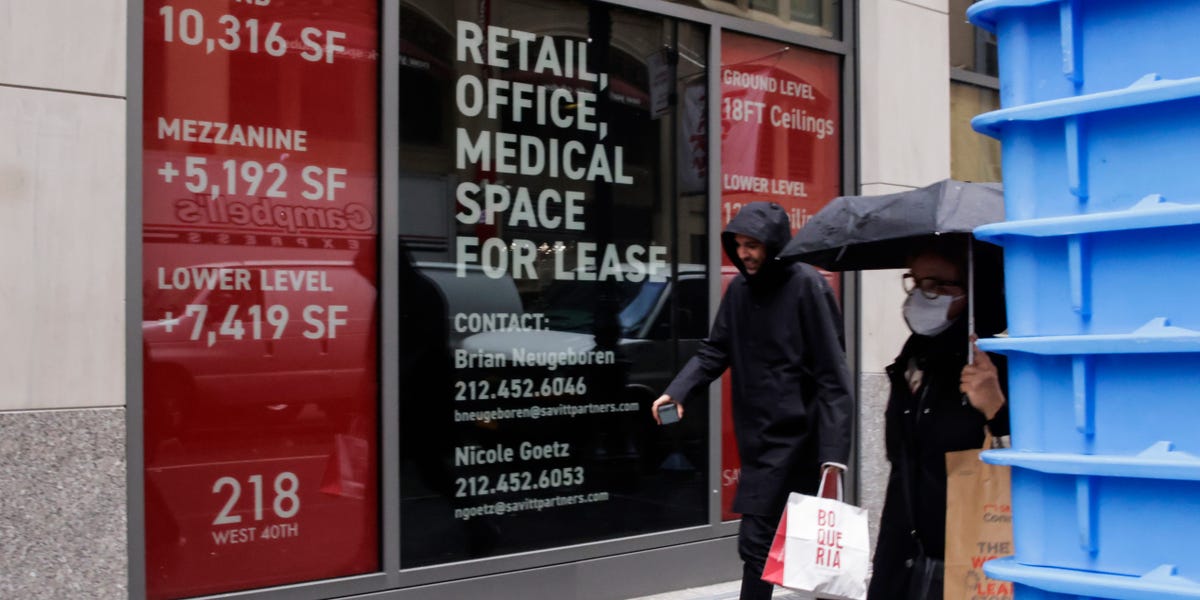Let. Them. Fail.
Hot take.
White collar work significantly shifted in 2020, and most big America metros are now full of vacant offices. Those would’ve been a very boring / safe investment if the world kept plugging along as it had for the past 75 years.
We should find a way to incentivize converting these spaces into residential use. That’s what we need right now, and we should look at this as an opportunity to lower housing demand and housing prices.
Not a hot take, I think most people agree with that. Unfortunately, it’s not that simple. In many cases, the cost of demolishing the building and building a brand new apartment building is cheaper than converting the current building. From floor plan to ceiling height to water and electrical lines, office buildings just aren’t built to handle residential uses.
Yeah, that’s a fair point. You basically need to knock out all of the walls, and even then, you probably need cities and states to get creative with things like egress laws.
In place like SF there is so much useless office space now, and a massive need for housing. I’d love for us to find away to repurpose that square footage for what is actually needed - housing.
Yeah, I can only imagine what a nightmare of zoning regulations and everything else it is on top of the upfront cost, which none of these property owners want to pay.
I can’t help but think, though, how much better our cities would be if we replaced all that empty office space with housing. I watched a great video once about how a city in New York has removed half of the aging highway ring in the city and is planning on removing the other half because of how replacing it with local roads has not only opened up tons of new land for development, but also revitalized their dying city core because of how much more accessible it is.
We just bailed out SVB, gotta keep this money printer going my guy.
Depends on who takes the loans. Big banks and the 1%, bailout. Us, recession/depression incoming.

Yeah, it ends with the littles guys footing the bill for the big guys so they don’t get boo-boo’s. Corporate socialism ho!
You know what they say “privatize the profits, socialize the losses”
Kinda. The housing crisis was caused by new schemes around high risk home loans. A lot of these commercial property loans were likely deemed very low risk, but then a global pandemic completely upended a century of commercial real estate precedent.
Go to any major metro area in the western world, and you’re probably going to find lots of vacant offices and commercial tenants thirsting for their lease to expire.
So a similar end result, but how we got here was likely a less about greed and negligence, and more about a radical shift in human behavior.
Wrong country bud
Well yes but no
I mean, this is literally a very China specific housing problem, and it is not related to the main article, which is about people vacating offices to work remote.
“Only seen in the worst collapses of the last 3 decades” is an interesting phrase to unpack.
This is like comparing a burrito to a cheesecake. They might both include flower and cheese, but they are very different things. Just because these stories both involve real estate and lending doesn’t mean they’re related.
China’s problem is a big mess with developers over borrowing in the past, and not and being able to borrow now. The problem in your main article is mainly about commercial buildings like offices, which people no longer want to lease, because so many people are working remote.
This vacant office problem has less to do with greed and more to do with white collar humans deciding to instantly, and radically, change where they go to work.
Oversupply in real estate causing banking debts to go underwater is the same problem, regardless of how that oversupply happened.
The nuance is important because who or what we blame will guide our solutions to the problem and what we do to mitigate the risk of it happening again.
The burrito and the cheesecake are both food, but if you start eating a cheesecake a couple times a week for lunch, you’re going to have problems. Nuance is important.
Can you name a source that isn’t some boomer propaganda?
The ‘reserves’ are just money they put away for bad loans. All this means is that they’ll have some quarters of lower profits, NOT that they’re going bankrupt.
Perhaps. But my guess is that this ain’t going to be a “few quarters” thing. More people are working remote and we just don’t need commercial office space like we did 5 years ago. Things have radically changed, and many companies are bailing on their leases as soon as they come to the end of their term. And commercial leases are often 3 to 10 years. So people are going to be bailing from those over the rest of this decade. That risk of large loan default could continue to increase.
Bingo. My company sub-leased some downtown office space to get out of it and will bail on it completely in about 5 years when the lease expires.
Yeah, same story for my company and just about all of my friends with white collar jobs. Most offices that lease property are downsizing and consolidating their spaces. Most of the people trying to use their offices are the big tech giants who actually built and own their campuses outright. Everyone else just sees a giant waste of money for very little productivity gains.
Yeah, I don’t disagree that these loans are going to cause trouble for a long time, but I disagree with the headline implying these banks can’t meet their deposits.
I think that, over the next decade, many of these commercial buildings will undergo retrofits (say to turn them into housing) which will help the owners / lenders recoup much of the costs.
IMHO, I need context for the risk numbers they’re throwing around. I don’t have enough information to make a call one way or the other.
What should a healthy bank, that is doing right by its clients, have in reserve? What does the trend line for reserves look like? What is going to happen if banks are sitting on a bunch for foreclosed office buildings that are cheaper to demolish than to redesign into housing? If banks take a giant unexpected loss on a formerly safe investment, what does that do to the other customers using other financial products?
Lower profits means death
I wonder how much of this is driven by the shift to remote and hybrid work. My city (San Francisco) is littered with vacant and sparsely populated commercial properties that are desperately trying to attract corporate tenants with cheap leases.
Moreover, no one is converting these unused offices in to residential properties. I’m guessing because the average price per square foot is significantly lower for SF property targeting residential use.
Moreover, no one is converting these unused offices in to residential properties. I’m guessing because the average price per square foot is significantly lower for SF property targeting residential use.
That’s part of it, but there’s also significant up-front costs to doing that type of conversion. If enough spaces become apartments, the remaining commercial space will profit without needing nearly as much investment, so the property owners are in a bit of a game of chicken to see who will break first and convert or sell low and start tanking the market.
I read a thing where they can do this with commercial buildings from before like 1950, but a lot of the big skyscrapers are harder. The older buildings have a smaller footprint, so it’s easier to convert them to apartments with windows and a decent layout. When you convert the big buildings, you either end up with a bunch of really long, thin apartments with a window at one end and no natural light in the other rooms, which makes them unappealing; or you get a bunch of apartments clustered around the edges with all sorts of unused space in the center. You can convert the center space into functional space - storage units for the apartments, a gym, meeting rooms, etc - except then you’re committing to higher costs for maintenance, cleaning, insurance, etc.
Personally, I’d like to see the second option become a thing, but then I don’t own any large commercial real estate, so …
AGAIN ???
Didn’t we JUST do this shit? How many goddam times are WE, the people who pay for it, going to give money to “THEM” - the people & corporations the government will “bail out”. Fuck this game.
Convert them to condos, like they did with all the warehouses when supply chains transitioned to just-in-time. Two birds, one stone.






